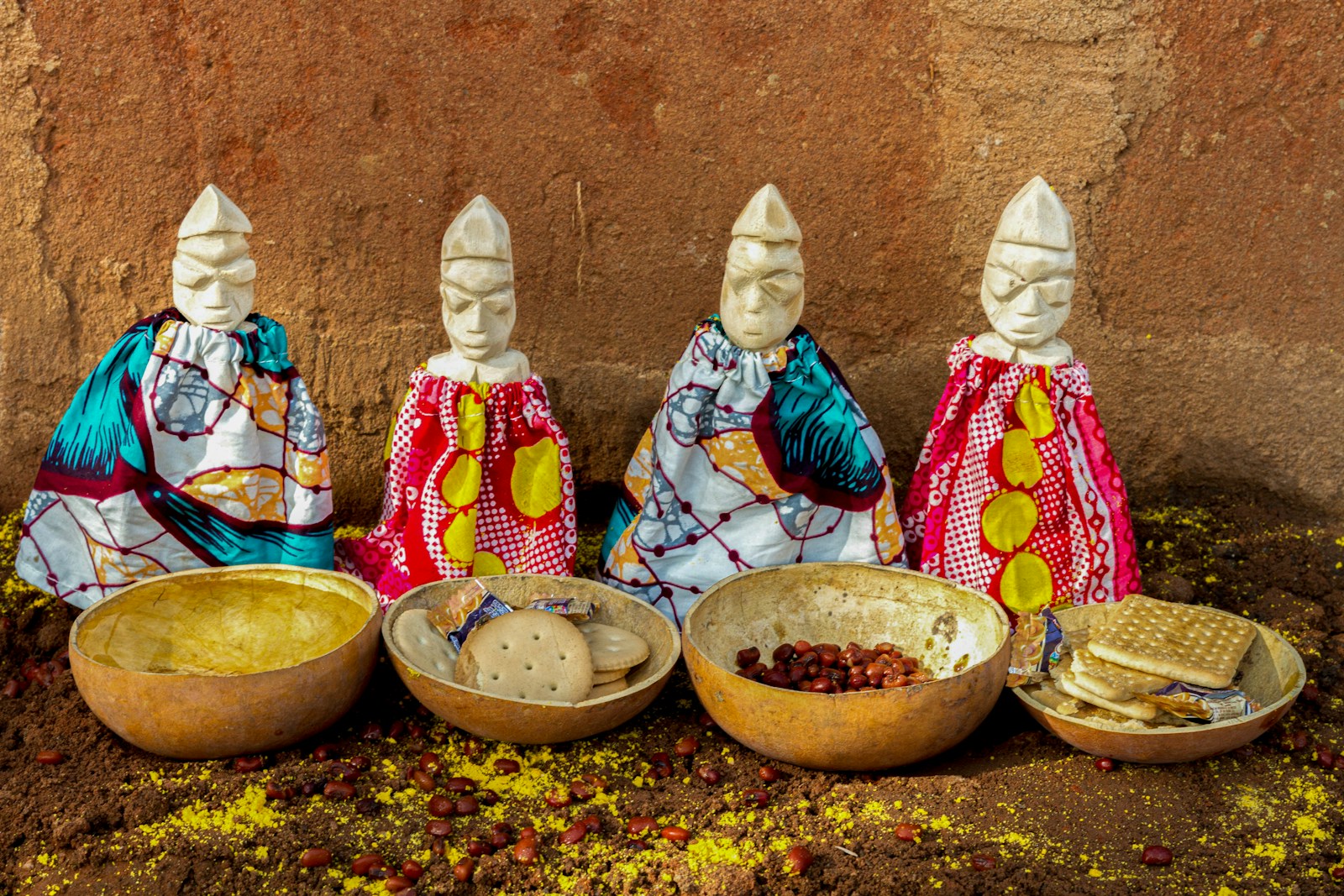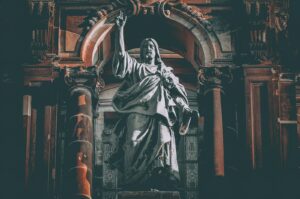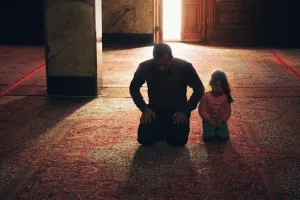Haitian Voodoo, or Vodou, is a deeply intertwined cultural and spiritual practice that has its roots in Haiti, melding African tribal religions, Catholicism, and indigenous beliefs into a cohesive system of spirituality. Its central focus is on the worship of lwas, or spirits, seen as intermediaries between the human world and the divine. These spirits have distinct personalities and responsibilities, representing various facets of life, including health, wealth, love, and nature. Practitioners cultivate relationships with the lwas through initiation and ongoing spiritual connection, often seeking their guidance and protection through vibrant rituals involving dance, music, and offerings.
Understanding the Lwa and Rituals
In Haitian Vodou, each lwa is associated with specific aspects of life and has unique attributes and preferences. For example, Papa Legba is the gatekeeper between the spiritual and physical worlds, often invoked at the beginning of ceremonies to open the way for communication with other spirits. His presence is crucial, as he is the one who allows other lwas to enter the sacred space. Erzulie Freda, associated with love and beauty, is honored with offerings of perfume, jewelry, and sweets. Her rituals often involve heartfelt expressions of personal desires and gratitude.
Rituals are community-focused events where drumming and singing create a sacred space, allowing participants to enter trance states and connect with the lwas. These ceremonies are not just spiritual but also serve as vital community events, strengthening social bonds and cultural identity. The use of vibrant colors, traditional costumes, and symbolic gestures during these rituals is a testament to the rich cultural tapestry from which Haitian Vodou draws its strength.
The Role of Symbolism
Symbols play a crucial role in Vodou rituals, serving as a bridge between the physical and spiritual worlds. Veves, intricate symbols drawn on the ground with powders like cornmeal or flour, are used to represent the presence of specific lwas during ceremonies. These symbols are believed to summon the spirits and facilitate communication. The careful creation of veves is an art form in itself, requiring precision and understanding of its spiritual significance.
Initiation and Community Roles
Initiation into Haitian Vodou is a profound spiritual journey, marking the beginning of a lifelong relationship with the lwas. This process often involves a series of elaborate ceremonies where the initiate, known as a hounsi, is introduced to the spirits and taught the sacred knowledge and secrets of the tradition. The initiation process can last several days, with ceremonies that include offerings, prayers, and the symbolic rebirth of the initiate.
The roles of houngans (priests) and mambos (priestesses) are crucial, guiding the community in spiritual matters and maintaining the tradition’s rituals and practices. They play an essential role in education, healing, and mediating disputes, reflecting the communal and hierarchical nature of Haitian Vodou. These leaders are often seen as pillars of the community, acting as spiritual advisors and protectors for those who seek their wisdom.
Training and Responsibilities
Becoming a houngan or mambo is not a simple task. It requires years of training and dedication. These spiritual leaders are taught how to interpret dreams, perform healing ceremonies, and communicate with the lwas. Their responsibilities extend beyond rituals; they are also entrusted with the wellbeing of their communities, offering guidance and support in times of need.
The Cultural Tapestry of Haitian Vodou
Haitian Vodou is a reflection of Haiti’s complex history, shaped by the convergence of African, French, and indigenous influences. This syncretism is evident in the pantheon of spirits, many of whom have counterparts in Catholic saints, allowing practitioners to seamlessly blend their ancestral beliefs with the imposed colonial religion. The tradition’s adaptability and resilience have enabled it to survive despite centuries of oppression and stigmatization, remaining a vibrant and vital part of Haitian culture and identity.
Syncretism and Adaptation
One of the most fascinating aspects of Haitian Vodou is its ability to adapt and incorporate elements from other cultures. This adaptability is not just a historical footnote but an ongoing process. As practitioners move and settle in different parts of the world, they bring with them their traditions, which continue to evolve and blend with local customs.
Louisiana Voodoo: A Rich Melting Pot
Louisiana Voodoo, distinct from its Haitian counterpart, emerged in the southern United States, particularly in the culturally rich state of Louisiana. It shares some similarities with Haitian Vodou, such as the veneration of spirits and the integration of African, Catholic, and Native American elements. However, it has evolved into its own unique tradition, characterized by a strong emphasis on ancestor veneration and personal spirituality.
Historical Context
The development of Louisiana Voodoo is deeply intertwined with the state’s history, particularly during the 18th and 19th centuries. The arrival of African slaves brought their spiritual practices, which began to blend with French colonial Catholicism and Native American practices. This cultural fusion was further influenced by the influx of Haitian refugees in the early 19th century, who brought their Vodou practices, enriching the existing spiritual landscape of Louisiana.
Ancestor Worship and Personal Practice
In Louisiana Voodoo, ancestors are central figures, seen as powerful and protective spirits who continue to influence the lives of their descendants. This focus on ancestors differentiates Louisiana Voodoo from Haitian Vodou, where the lwa are more prominent. Practitioners often create altars or shrines in their homes, dedicated to their ancestors and spirits, adorned with candles, photographs, and personal mementos. These spaces serve as focal points for prayer, meditation, and offerings, fostering a personal and intimate connection with the spiritual world.
Creating Sacred Spaces
Creating a sacred space in the home is a deeply personal practice for many Louisiana Voodoo practitioners. These altars are not merely decorative; they are living spaces that evolve over time. Personal items, such as family heirlooms or objects with sentimental value, are commonly used to strengthen the connection with ancestors. The act of maintaining and tending to these altars is a form of ongoing spiritual dialogue, a way to honor the past and seek guidance for the future.
The Role of Music and Dance
Music and dance are integral to Louisiana Voodoo rituals, often incorporating elements of blues and jazz, which have deep roots in the region’s cultural history. These musical traditions are not merely entertainment but serve as conduits for spiritual energy, setting the rhythm for rituals and facilitating communication with the spirits. The use of music in Louisiana Voodoo reflects the broader cultural landscape of the region, where African, French, and American influences intersect, creating a vibrant and dynamic spiritual practice.
Musical Instruments and Rituals
Drums are perhaps the most iconic musical instruments in Voodoo ceremonies, their rhythm serving as the heartbeat of the ritual. Other instruments, like maracas and bells, are also used to enhance the auditory landscape of the ceremony. These sounds are believed to attract spirits and invite them into the ritual space, creating an atmosphere of communal participation and spiritual energy.
Influences and Evolution
The development of Louisiana Voodoo is deeply intertwined with the state’s history of slavery, cultural exchange, and adaptation. The blending of African, French, Spanish, and Native American traditions has resulted in a unique spiritual practice that reflects the diverse experiences and identities of its practitioners. Louisiana Voodoo has been shaped by the region’s particular social and historical context, including the legacy of slavery and segregation, which has influenced its evolution and expression.
Modern Adaptations
In modern times, Louisiana Voodoo continues to evolve, influenced by contemporary culture and global connectivity. Practitioners are increasingly using digital platforms to connect with one another, share knowledge, and organize events. This digital presence is bringing new visibility to the practice, allowing it to reach a wider audience and fostering a new generation of practitioners who are as diverse as the tradition itself.
Practical Tips for Engaging with Voodoo Traditions
If you’re interested in learning more about or participating in Voodoo traditions, there are several practical considerations to keep in mind:
- Approach with Respect: Both Haitian and Louisiana Voodoo are deeply rooted in cultural and spiritual history. It’s crucial to approach them with respect and an open mind, recognizing the sacred nature of these practices. Avoid commodifying or trivializing these traditions, as they hold deep meaning for their practitioners.
- Research and Education: Before participating, take the time to learn about the history, beliefs, and rituals of Voodoo. Read books by practitioners, attend lectures or workshops, and engage with the community to gain a deeper understanding. Seek out resources that provide authentic perspectives and avoid those that sensationalize or misrepresent the practices.
- Connect with Practitioners: Building relationships with practitioners is essential. Attend public ceremonies or events, and consider seeking guidance from a knowledgeable houngan or mambo who can provide insights and answer questions. This engagement should be approached with humility and a genuine desire to learn, rather than mere curiosity or spectacle.
- Participate Mindfully: If invited to a ceremony, observe respectfully and follow the guidance of the practitioners. Participation is often encouraged, but it’s important to be mindful of cultural practices and traditions. Be aware of your role as an observer and participant, and respect the boundaries set by the community.
- Create Personal Space: For those drawn to the spiritual aspects of Voodoo, creating a personal altar or shrine at home can be a meaningful way to engage with the tradition. Include items that resonate with you spiritually, such as candles, symbols, or personal mementos. This space can serve as a daily reminder of your spiritual journey and a place to reflect and seek guidance.
- Engage with the Community: Participating in community events, such as festivals or public ceremonies, can be a rewarding way to experience Voodoo culture firsthand. These gatherings are often open to outsiders and provide an opportunity to witness the vibrancy and communal spirit that defines these traditions.
Common Misconceptions and How to Avoid Them
Voodoo is often misunderstood and misrepresented in popular culture, leading to several misconceptions:
- Myth of Malevolence: A common misconception is that Voodoo is solely about dark magic or harmful practices. In reality, Voodoo is a spiritual tradition focused on healing, protection, and community well-being. Practitioners prioritize positive outcomes, using their spiritual knowledge to foster harmony and balance.
- Confusion with Pop Culture: Voodoo is frequently depicted inaccurately in movies and television, often sensationalized for entertainment. Authentic Voodoo practices are deeply spiritual and culturally significant, rooted in community and ancestral reverence rather than the exoticism often portrayed on screen.
- Overemphasis on Voodoo Dolls: While Voodoo dolls are part of the tradition, they are primarily used as tools for healing and guidance, not for harm. Understanding their true purpose is key to appreciating their role in Voodoo. These dolls are often created with care and intention, used to focus energy and intentions for healing or protection.
- Misinterpretation of Rituals: Many outsiders misunderstand the purpose and meaning of Voodoo rituals, viewing them as mysterious or even threatening. In truth, these rituals are deeply meaningful acts of devotion, community bonding, and spiritual connection. They are expressions of faith and cultural identity, deserving of respect and understanding.
By approaching Voodoo with an informed and respectful perspective, individuals can gain a richer understanding of its cultural and spiritual significance, appreciating its value as a living tradition that continues to enrich the lives of its practitioners. Engaging with Voodoo requires an open heart and mind, a willingness to learn and participate in a way that honors the depth and diversity of this profound spiritual path.




